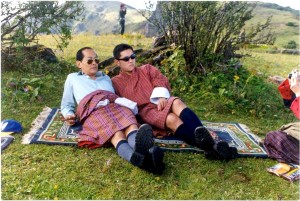The tobacco debate
The announcement by the king to marry later this year did not heat up buzz in Bhutanese parliament this session rather the controversial law on smoking rein on. Ever since a monk was jailed for three years for carrying few packets of tobacco, the anti-tobacco activism rose sharply in the country.
Recently, the high court upheld the verdict of the Thimphu district to send the monk Sonam Tsheting behind the bars for three years. Bhutan had received much appreciation from people and organisations when it introduced the anti tobacco laws few years back. However, as it comes into effect and take toll on general life, the people have started speaking. The parliamentarians were forced to speak what people talk.
Running out of the scheduled debate, the parliamentarians charged each other or supporting or opposing the law. Even the speaker, who should have been non-judgemental during the parliamentary debates as principles prescribe, seems to be advocating in favour of the government – criticising the lawmakers of speaking against the law.
It astonished me if the Bhutanese newspapers correctly reported – the speaker advised that parliamentarians are not entitled to discuss the law outside parliament building. It is core democratic phenomenon that any laws are discussed among people before being adopted and after their implementation.
The tobacco debate crossed the border into literary festival and social networking sites. International agencies and media closely followed the events in Bhutan aftermath of the being implemented.
The two-member opposition continue to demand amendment in the anti tobacco law. Leader of opposition in the National Assembly expressed his utter dissatisfaction over the act. In his blog, Tshering Tobgay writes:
Ten packets of cigarettes, just ten packets – that’s how much most smokers consume in ten days – and three people are going to jail for a total of nine years!
I called the Tobacco Control Act draconian. It’s much worse. It’s utter madness.
The anti tobacco law activists seem to be further infuriated when Paro district court sent three more people (army captain Sonam Tshewang, army constable Tshering Jamtsho, and aircraft engineer Chogyal Gyeltshen.) to jail this week for their alleged involvement in smuggling tobacco. They were earlier given a year-long bail. The court slapped three-year prison term for all of them caught in second week of March. at Paro Airport. Similarly, Gaylegphug sub-divisional court gave verdict on similar lines against Gem Dorji and Lal Bahadur Neopaney for allegedly smuggling tobacco. Another man was caught on May 20. An Indian national faced similar fate.
To lessen the increasing public anger, the narcotic control agency came up with a flowery solution – to disallow people with tobacco products more than permitted from entering the country instead of arresting them. This is done through increased vigilance at the border check posts. Similarly, a new guideline prepared by police chief has proposed that
any Bhutanese bringing in tobacco products, more than the permissible quantity for personal consumption through designated port of entry, will not be directly charged for smuggling, but would be levied a 200 percent tax. The proposal is awaiting cabinet approval.
Those supporting government move are bringing evidences to show that stricter laws, such as in China, are necessary to control the tobacco consumption. A new report by International Tobacco Control agency saying Bhutanese people in general want tobacco consumption be banned has boosted government morale.

At this juncture, I wish to share a picture where our king takes rest with a Cuban cigar. I personally feel this picture holds an important place in Bhutan when the country debates on tobacco and smoking laws.
The law was passed when Bhutan was still autocratic and wanted bubbling attention to its whimsical Utopian ideals. Now at least it is “semi-democratic” and thus the debates on a draconian law. Wish Bhutan could consider eradicating communicable diseases by providing better hygiene and sanitation to the rural poor such that each house has a toilet, running water and electricity. Can the MPs debate on such issues and bring about a healthy environment and uplift the rural poor in central Bhutan especially places inaccessible by roads.
Oh my goodness! an incredible article dude. Thank you Nevertheless I am experiencing concern with ur rss . Don’t know why Unable to subscribe to it. Is there anyone getting similar rss downside? Anyone who is aware of kindly respond. Thnkx
An attention-grabbing discussion is worth comment. I believe that you need to write extra on this subject, it may not be a taboo subject however usually individuals are not enough to talk on such topics. To the next. Cheers